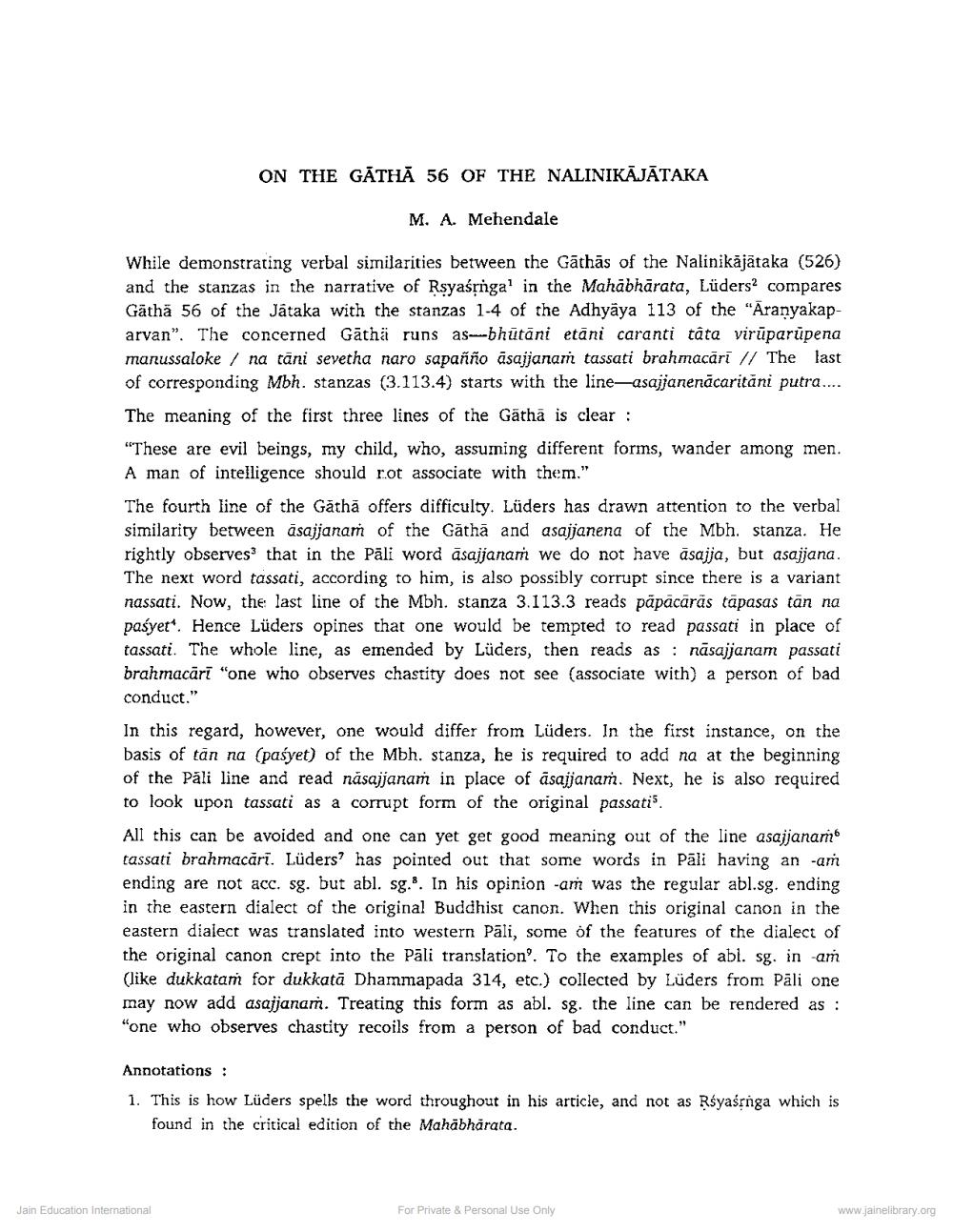Book Title: On Gatha 56 of Nalinikajataka Author(s): M A Mahendale Publisher: Z_Nirgrantha_1_022701.pdf and Nirgrantha_2_022702.pdf and Nirgrantha_3_022703.pdf View full book textPage 1
________________ ON THE GĀTHĀ 56 OF THE NALINIKĀJĀTAKA M. A. Mehendale While demonstrating verbal similarities between the Gāthās of the Nalinikājātaka (526) and the stanzas in the narrative of Rsyaśộnga' in the Mahābhārata, Lüders? compares Gäthä 56 of the Jataka with the stanzas 1-4 of the Adhyâya 113 of the "Aranyakaparvan". The concerned Gäthä runs asbhūtāni etāni caranti tâta virüparūpena manussaloke / na tāni sevetha naro sapañño asajjanam tassati brahmacārī // The last of corresponding Moh. stanzas (3.113.4) starts with the line-asajjanenācaritāni putra.... The meaning of the first three lines of the Gātha is clear : "These are evil beings, my child, who, assuming different forms, wander among men. A man of intelligence should rot associate with them." The fourth line of the Gathā offers difficulty. Lüders has drawn attention to the verbal similarity between asajjanaṁ of the Gathā and asajjanena of the Mbh. stanza. He rightly observes that in the Pāli word asajjanam we do not have asajja, but asajjana. The next word tassati, according to him, is also possibly corrupt since there is a variant nassati. Now, the last line of the Mbh. stanza 3.113.3 reads pāpacaras tāpasas tan na paśyet. Hence Lüders opines that one would be tempted to read passati in place of tassati. The whole line, as emended by Lüders, then reads as : nāsajjanam passati brahmacārī "one who observes chastity does not see (associate with a person of bad conduct." In this regard, however, one would differ from Lüders. In the first instance, on the basis of tān na (pasyet) of the Mbh. stanza, he is required to add na at the beginning of the Páli line and read násajjanam in place of asajjanam. Next, he is also required to look upon tassati as a corrupt form of the original passatis. All this can be avoided and one can yet get good meaning out of the line asajjanam tassati brahmacāri. Lüders? has pointed out that some words in Pāli having an -am ending are not acc. sg. but abl. sg.. In his opinion -am was the regular abl.sg, ending in the eastern dialect of the original Buddhist canon. When this original canon in the eastern dialect was translated into western Pāli, some of the features of the dialect of the original canon crept into the Pāli translation. To the examples of abl. sg. in an (like dukkatam for dukkatā Dhammapada 314, etc.) collected by Lüders from Pāli one may now add asajjanam. Treating this form as abl. sg. the line can be rendered as : "one who observes chastity recoils from a person of bad conduct." Annotations : 1. This is how Lüders spells the word throughout in his article, and not as Rśyasrnga which is found in the critical edition of the Mahabharata. Jain Education International For Private & Personal Use Only www.jainelibrary.orgPage Navigation
1 2
